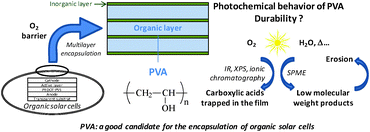French scientists explain how polyvinyl alcohol (PVA) is an excellent oxygen-barrier polymer for solar cell encapsulation. The team led by Jean-Luc Gardette, at the University of Clermont, conducted photochemical studies of PVA under solar light. They showed that the photooxidative degradation of PVA are restricted to the first 5 micron at the surface of the exposed films. The researchers also identified the low molecular weight products such as carboxylic acids that can be trapped in the film or migrate in the gas phase and they proposed an oxidative mechanism to account for these modifications.
However, the most appealing property of PVA is its “high stability upon irradiation in the absence of oxygen, even after long exposure in conditions of accelerated ageing”, says Gardette. Indeed, PVA is an excellent candidate for the multilayer encapsulation system of Organic Solar Cells (OSCs) due to its high durability, “as long as the PVA layer is protected from
air by an inorganic layer as a first outside layer in the inorganic/organic multistack”.
Register here to read the full article for free:
Photochemical behavior of PVA as an oxygen-barrier polymer for solar cell encapsulation
Julien Gaume, Pascal Wong-Wah-Chung, Agnès Rivaton, Sandrine Thérias and Jean-Luc Gardette
RSC Adv., 2011, Advance Article, DOI: 10.1039/C1RA00350J











